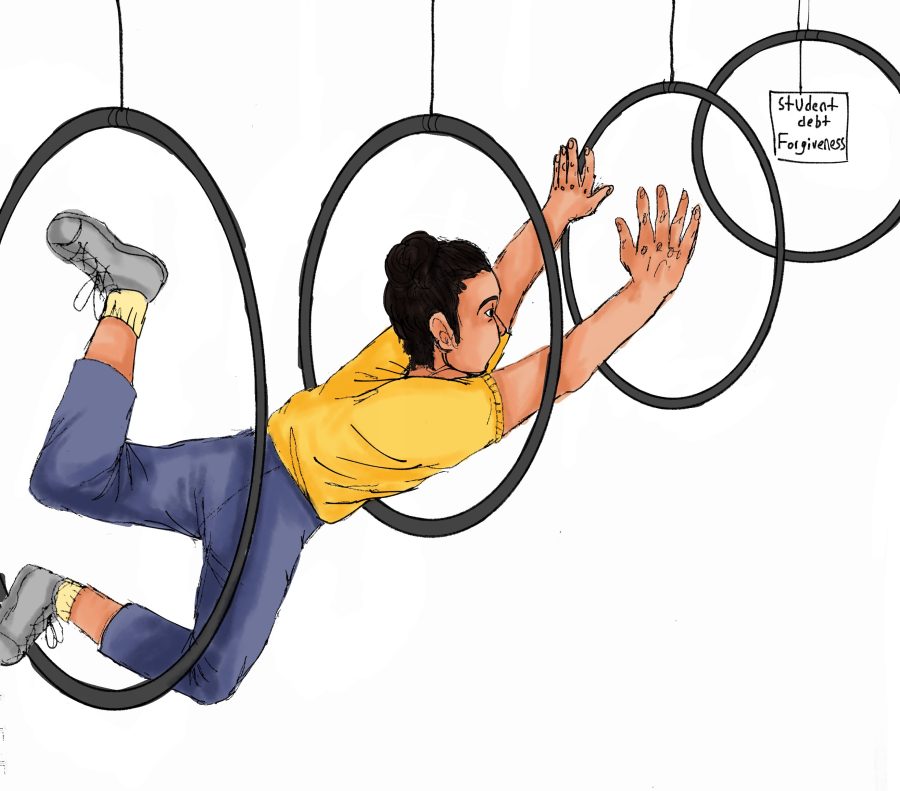Sydney Harper
Opinion editor
sharper16@murraystate.edu
President Joe Biden introduced a new student loan forgiveness plan on Aug. 24 to relieve some people from crushing student debt. The plan is restricted to single people making $125,000 or less and married households making $250,000 or less. Most borrowers will gain up to $20,000 in relief for recipients of a Pell Grant and $10,000 for non-recipients.
According to the Chronicle of Higher Education, an estimated 45 million people hold about $1.7 trillion in student debt, meaning about 20 million borrowers will have their debt completely canceled. Although this plan is life-changing, some people have negative perceptions of the plan.
Many people hold the idea that because they had to pay off their debt years ago, current students and graduates with debt should face full responsibility for their student debt. Sure, this idea seems harmless, but students now face significantly more debt than the generations before them. CNBC noted that student debt in the U.S. has grown by 100% in the last 10 years.
At The News, we believe this program will benefit a greater number of people than it will harm. It may not seem “fair” to help debtors at this point rather than earlier, but this program will benefit so many that the “fairness” pales in comparison.
According to the Kentucky Center for Economic policy, 209,400 residents would have loans forgiven out of the roughly 616,000 facing student debt. That’s more economic stability and better livlihoods for Kentuckians saving for a home, a car, and keeping food on the table.
The increasing loan debt we are seeing as students is staggering, and all we really need is a small amount of relief so we do not sink. For many students and graduates, $10,000 is only a small drop in the bucket for their loans. Although many people still owe thousands, this plan is certainly a step in the right direction for many across the country.
We all could have a bit more empathy for people in these situations. When someone is in debt, many people say they should “pull themselves up by their bootstraps” and work for it themselves. While work ethic is important, sometimes it becomes impossible to keep up with financial obligations given the debt-to-income ratio in which more and more people find themselves.
We at The News also believe this plan sets people up for more success after graduation. According to a statistic from intrust.org, 1 in 6 Americans has educational debt. Additionally, the current student loan debt in the U.S. is $1.6 trillion. These numbers alone are staggering, but even more so when we are reminded of the people on the other end of them.
In addition to people finding it more accessible to pay off their debt with this new plan, their quality of life will also increase significantly. Unfortunately, student debt is not the only kind of debt people are working to pay off. Car payments, mortgage payments, credit card bills, medical bills and other expenses are debts people across our country are working, and struggling, to pay off. The increase in quality of life will come from one less monthly bill most Americans are significantly impacted by.
A 2015 Gallup poll found that Americans who graduated from college between 1990 and 2014 and who had borrowed $50,000 or more were less likely to thrive physically, emotionally or financially than their debt-free peers. Assistance will not only allow people to stay afloat; it will allow them to have an overall increased quality of life.
Telling people to work hard for their money isn’t cutting it anymore. People have continually worked far more hours for far less pay. For many people working graduate-level jobs, the pay is not enough and is becoming worse as the years go on. The ability to pay off student debt is just one issue many face, and in the state of our current economy, receiving a bit of assistance is incredibly beneficial.
If we want to see people “pulling themselves up by their bootstraps” they need some income to live on. According to the National Low Income Housing Coalition, there is nowhere in the U.S. where someone working a full-time minimum wage job could afford to live in a two-bedroom apartment.
Debt relief should not scare people into thinking they “have” to help people seeking an education. Instead, it should be exciting to help advance someone’s future in ways they had. Students now have to jump through so many more hoops just to attempt to get the same advantages the generations before them had, and it still isn’t enough.
This new plan is an opportunity to help people in need of assistance. Our generation can finally look towards affording a home and living comfortably. Those in opposition need to realize it is not an attack, it is a way to give younger people a chance to succeed in such a polarized world.





























































































